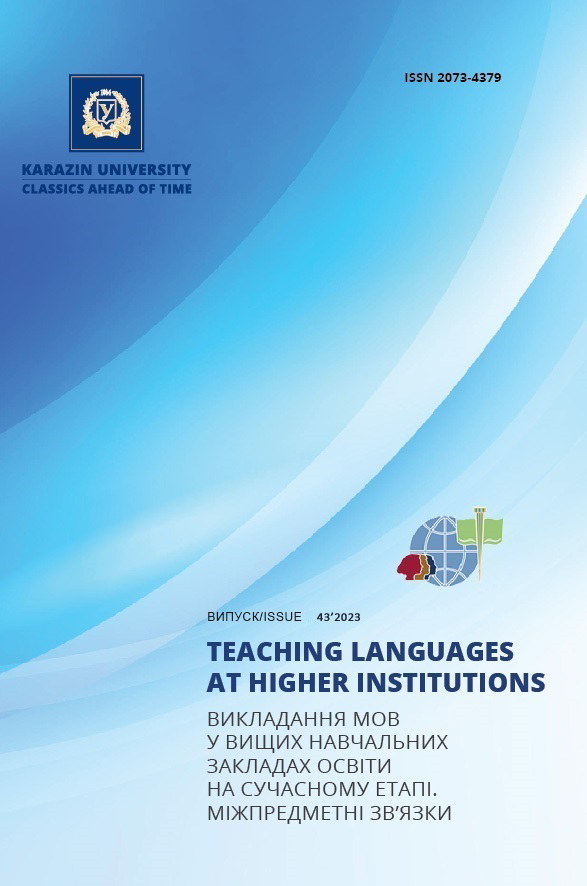Intersubject connections in the focus of teaching English in higher education institutions
Abstract
The article is dedicated to the analysis of English language teaching, taking into account the experience of implementing interdisciplinary connections in English classes at agricultural universities. The relevance of the article stems from the necessity to explore the subject relations between humanitarian disciplines and the courses “Foreign Language” and “Business Foreign Language”. The article addresses the current issue of the possibilities for implementing the “Law on the Use of the English Language in Ukraine”.
In the scientific literature, there is a multitude of opinions regarding the definition of the term “interdisciplinary connections”, leading to a significant number of works dedicated to various aspects of interdisciplinary connections. When characterizing the main features of interdisciplinary connections, the authors demonstrate the potential for reevaluating the process of teaching English in non-language higher educational institutions and highlight some advantages of implementing interdisciplinary connections, as observed in the process of teaching a foreign language to bachelorʼs and masterʼs students at Odessa State Agrarian University. These advantages include increased motivation among the students and enhanced communicative interaction among participants in the educational process.
The incorporation of an interdisciplinary approach in the context of using the English language in contemporary settings can find application in the development of work programs, the creation of English language manuals and online textbooks, as well as in the formulation of methodological recommendations. In the context of modern educational policy, the teaching of foreign languages in non-language higher education institutions can be approached from the perspective of both formal and informal education. This approach is characterized by the interdisciplinary integration of the courses “Foreign Language” and “Business Foreign Language” with humanities courses such as “Philosophy and Social Ethics”, “History of Ukrainian Statehood”, and “Ukraine – European Union”.
Downloads
References
Baranovska, O.V. (2006). Mizhpredmetni zviazky u pidruchnyku dlia profilnoi shkoly: praktychna zoriientovanist ta tekhnolohizatsiia [Interdisciplinary connections in a textbook for a specialized school: practical orientation and technology]. Problemy suchasnogo pidruchnyka [Modern manual problems]. Kyiv: Ped. Dumka, 6, pp. 17–26 [in Ukrainian].
Humenna, I.R., Nakhaieva, Y.M., Shatsky, V.V. (2021). Interdisciplinary approach to the formation of studentsʼ academic communicative competence in a medical institutions of higher education. Medical Education, (3), 87–91. DOI: https://doi.org/10.11603/m.2414-5998.2021.3.12601 [in Ukrainian].
Kazakevych O.І. (2022). Formation of leadership competence of future marketologists in the process of interdisciplinary training. Doctorʼs thesis. Dnipro: Alfred Nobel University [in Ukrainian].
Kozolup, M.S. (2014). Mizhdystsyplinarnyi pidkhid do formuvannia akademichnoi komunikatyvnoi kompetentsii u studentiv pryrodnychykh spetsialnostei v universytetakh SShA [An interdisciplinary approach to the formation of academic communicative competence in students of natural sciences at US universities]. Naukovyi visnyk Uzhhorodskoho natsionalnoho universytetu [Scientific Bulletin of the Uzhhorod National University]. Series “Pedagogy. Social work”, 30, pp. 60–63 [in Ukrainian].
Korostelova, Ye.Yu. (2021). Interdisciplinary links in the project activities of secondary school students as a basis for competence teaching of physics. Doctorʼs thesis. Kyiv: National Pedagogical Drahomanov University [in Ukrainian].
Mykytenko, N.O. (2011). Theory and Technologies of Forming Professional Foreign Language Competence of Prospective Specialists of Sciences. Extended abstract of candidateʼs thesis. Ternopil: Ternopil Volodymyr Hnatiuk National Pedagogical University [in Ukrainian].
Levchenko, T.I. (2007). Yevropeiska osvita: konverhentsiia ta dyverhentsiia [European education: convergence and divergence]. Vinnitsa: Nova knyha [in Ukrainian].
Proekt Zakonu Ukrainy Pro zastosuvannia anhliiskoi movy v Ukraini: Proekt Zakonu Ukrainy of 13.07.2023, no. 9432-1 [On the use of the English language in Ukraine: Draft Law of Ukraine no. 9432-1 of 13.07.2023]. Available at: http://ips.ligazakon.net/document/view/ji09534b?an=2 [Accessed 24 Aug. 2023] [in Ukrainian].
Rusalkina, L.G. (2019). Integration of professional and linguistic disciplines as a pedagogical condition of qualitative English-language professional training of future doctors. Pedagogical almanac, 42, pp. 136–142 [in Ukrainian].
Savchenko, O.Ya. (2017). Inter-curricula links as a resource for implementation of competency approach at the lessons of literary readings. Ukrainian Pedagogical Journal, 2, pp. 48–57 [in Ukrainian].
Syzenko, A., Diachkova, Ya. (2021). Criteria for the Selection of Speech Material for Teaching English for Specific Purposes to Public Administrators. Teaching Languages at Higher Educational Establishments at the Present Stage. Intersubject Relations, 39, pp. 97–110. DOI: https://doi.org/10.26565/2073-4379-2021-39-07 [in Ukrainian].
Semenova, A.V. (Ed.). (2006). Slovnyk-dovidnyk z profesiinoi pedahohiky [Dictionary-handbook of professional pedagogy]. Odesa: Palmyra [in Ukrainian].
Telychko, T.V. (2021). Formation of professional competence of future teachers of preschool educational establishments on the basis of interdisciplinary approach. Doctorʼs thesis. Mukachevo: Mukachevo State University [in Ukrainian].
Teriaieva, L.A. (2015). Interdisciplinary links in the forming of methodical competence of future music teachers. Educological discourse, 2 (10), pp. 264–273 [in Ukrainian].
Tupchenko, V.V. (2013). Teaching foreign language as means of intercultural communication in higher school. Spirituality of a personality: methodology, theory and practice, 5, pp. 199–204 [in Ukrainian].
Fodor, K.Y. (2021). Formation of socio-cultural competence of future foreign language teachers on the basis of interdisciplinary approach. Doctorʼs thesis. Mukachevo: Mukachevo State University [in Ukrainian].
Simona Elisabeta, Catana. (2014). Coping with the Knowledge Society: an Interdisciplinary approach of teaching English in a technical university. Procedia-Social and Behavioral Sciences, 128, pp. 158–163.
Clinton, Holding. (2009). Integrating the disciplines: Successful interdisciplinary subjects. Available at: http://gened.psu.edu/sites/default/ files/docs/LOA20- InterdisciplinaryCourse_HowToGuide-Gooding.pdf-[Accessed 24 Aug. 2023].
Newell, William H., Klein, Julie Thompson. (1997). Advancing Interdisciplinary Studies. Handbook of the Undergraduate Curriculum: Comprehensive Guide to Purposes, Structures, Practices, and Change. Jossey-Bass, pp. 3–22.

